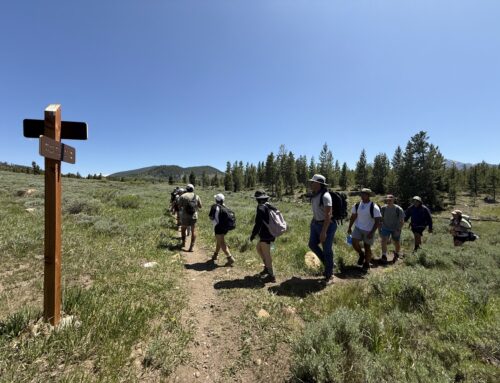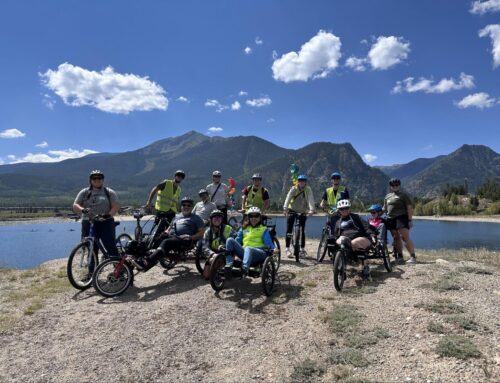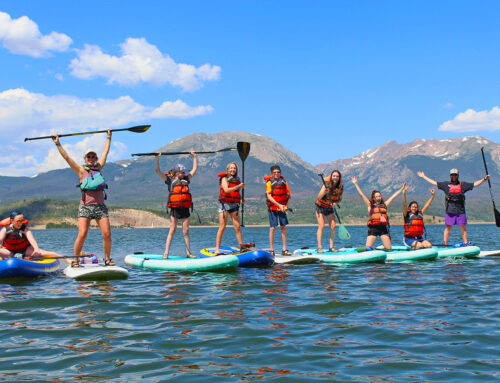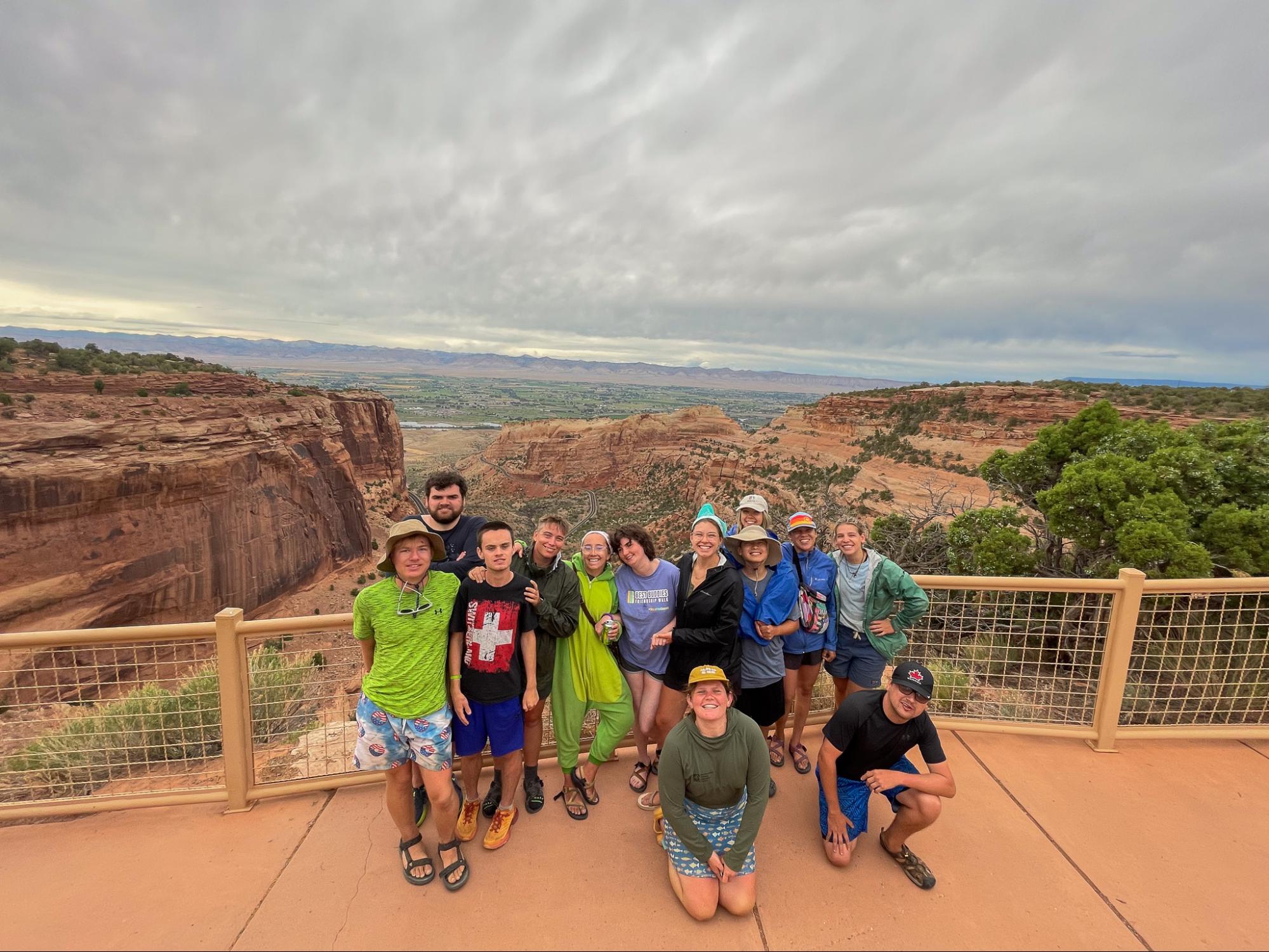
Wilderness Camp participants and staff at Colorado National Monument.
There’s something about being immersed in the outdoors on a river trip that creates a great environment for individuals to learn new things, from setting up camp and water navigation to teamwork and emotional growth. For over 20 years, the BOEC has led Wilderness Camp, a unique multi-day, backcountry river trip focused on neurodivergent young adults. Wilderness campers experience a classic western trip, spending their days outside floating down Ruby and Horsethief Canyons of the Colorado River in canoes, inflatable kayaks, and paddleboards. Beautiful views, frequent wildlife sightings, and opportunities for short hikes make this 25-mile stretch of river an excellent paddling experience.
In the last few years, there have been several returning participants to this camp like Devon who shares his experience from this year’s Wilderness Camp. “What was special about the trip was being on the river and taking in the beautiful scenery and seeing all the wildlife,” says Devon. He continues, “I did like being part of the BOEC because I had a wonderful time and people my age would also like attending the BOEC camp if lucky enough to have the opportunity to do so.” His favorite memory was being around people who took special care of him. This camp is the highlight of Devon’s year!
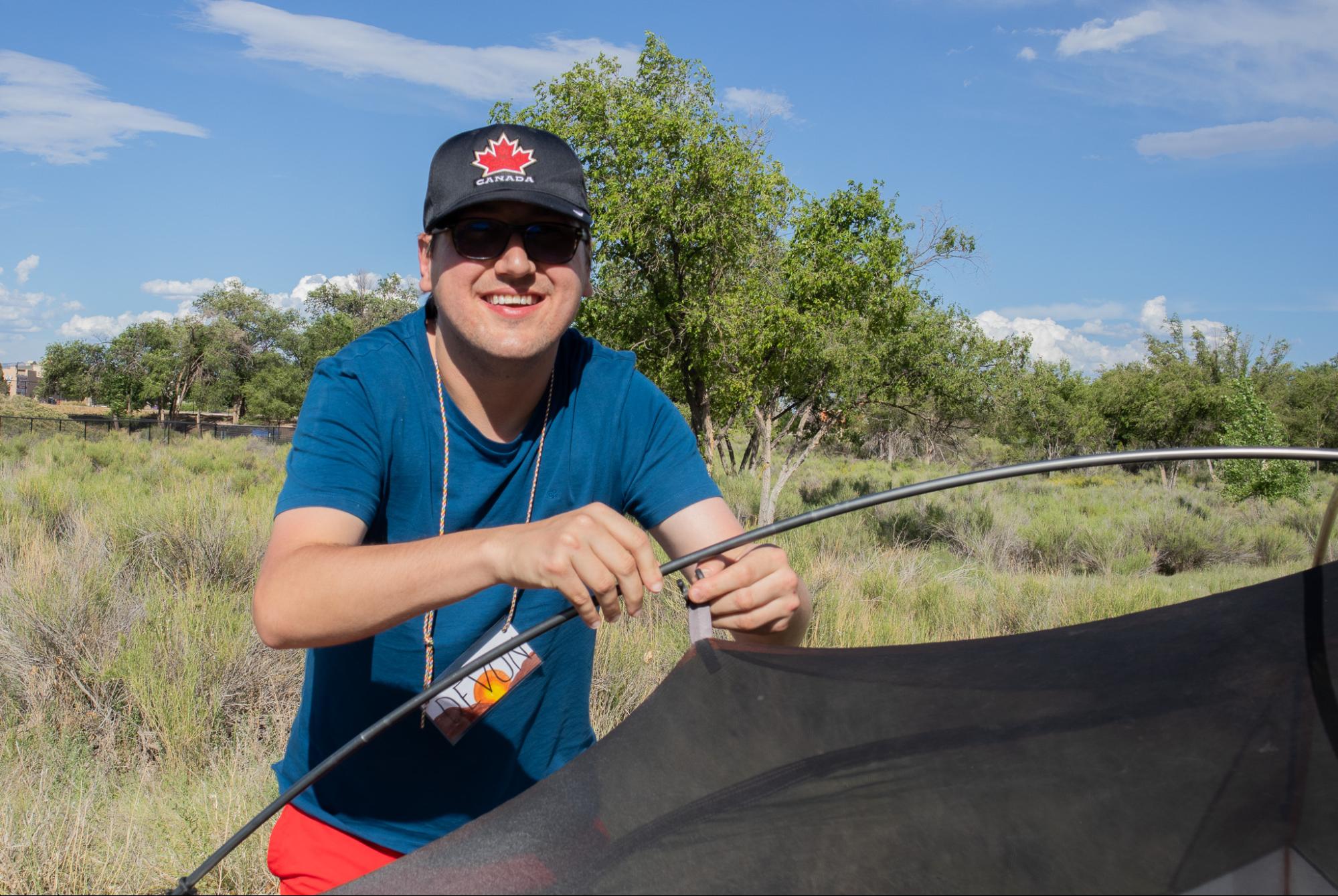
Devon setting up his tent during Wilderness Camp.
Wilderness Camp focuses on immersive outdoor education, teaching students camping, cooking, gear preparation, and river travel all while having fun in a structured setting. Activities are designed around established experiential education models, giving students the opportunity to develop social skills, teamwork, and leadership qualities.
Some of the staff shared their experiences from this year’s Wilderness Camp held in June. Over the three days on the water, they observed campers facing challenges and experiencing triumphs, offering support when needed and encouraging independence. The staff watched as participants gained confidence and grew in this environment. The coaching provided by the staff helped build a bond of trust between the campers and the staff. Through this experience, the young adults expressed, in their own ways, how meaningful it was to them.
Alli, BOEC staff member, shares the growth they saw amongst the campers learning outdoor skills,
“Most of the participants were very helpful and eager to learn throughout the trip; from setting up and tearing down tents to helping load the rafts with equipment. We had a couple of participants who had never done an overnight camping trip, and it was cool to see them become more comfortable and independent in their morning and night routines, relying less on staff for assistance as the days went on.”
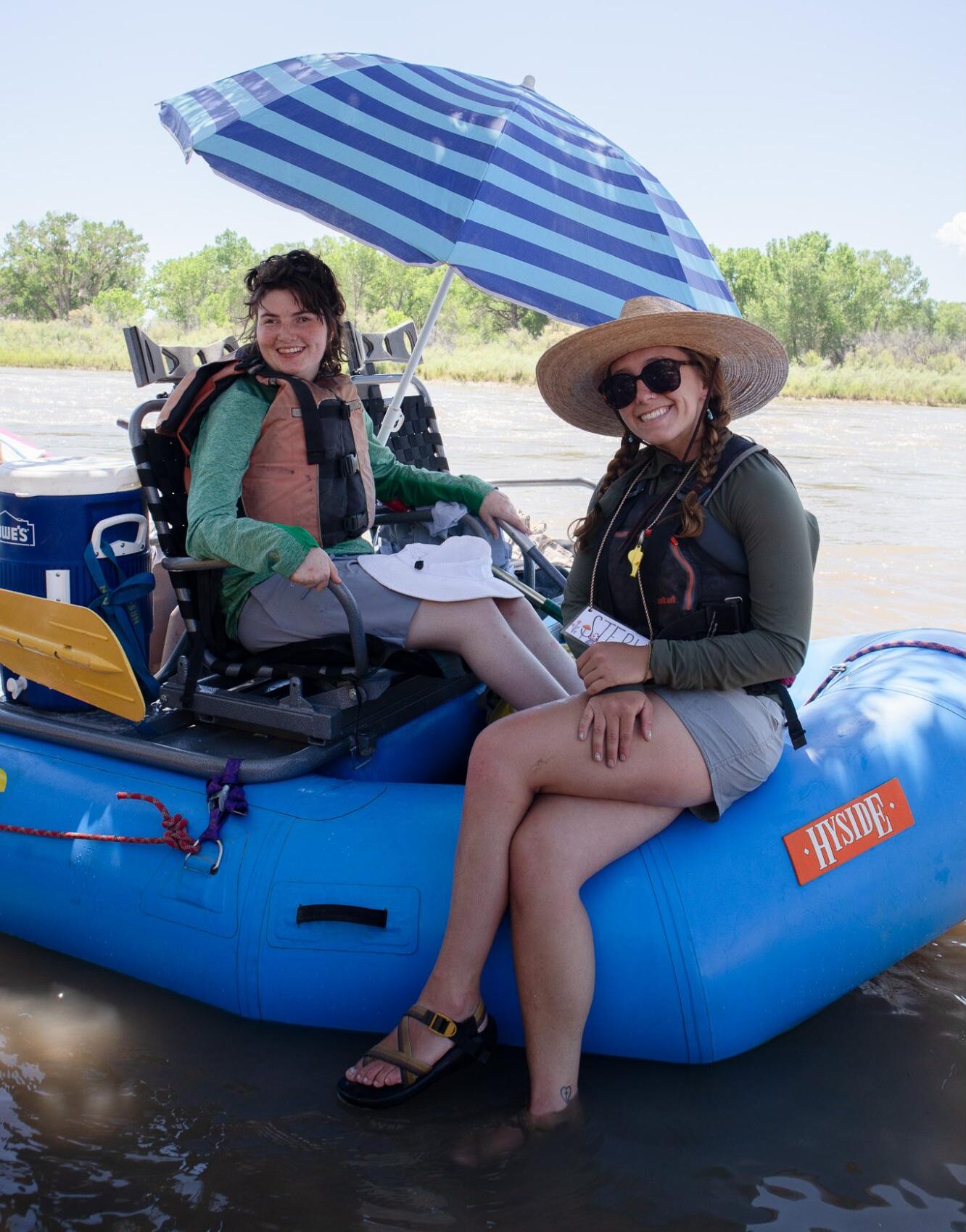
Steph, BOEC Intern Program Coordinator, and Jada, long-time BOEC participant ready for on water fun.
Another major focus of this course is improving social skills and learning how to live with a group of people with individual needs and preferences. BOEC staff member, Caleigh, explains it this way, “We learned how to respect each other’s space, how to communicate our needs, and how to encourage each other in both small and large ways. Whether this was picking out an outfit independently, trying a new food, or giving kayaking a go for the first time – everyone was so supportive of each others’ successes, both big and small.”
Since these participants spend multiple days immersed in the outdoors, they often encounter nature more intensely than in daily life. This trip had the challenge of mosquitos and heat. Staff ensured that there were damp sheets and shade tents to help with keeping participants cool. They also supplied plenty of bug spray and bug suits to ward off mosquitoes. Although these were challenges for the campers, they were able to adapt to any discomfort and even felt empowered as they learned to deal with these factors.
Another interesting aspect of Wilderness Camp is creating and facilitating group activities that all of the campers feel comfortable participating in. This group had a wide range of cognitive abilities, and some participants needed more assistance to understand the activities than others. It is a unique challenge to strike a balance with explanations that ensure all participants understand without oversimplifying directions.
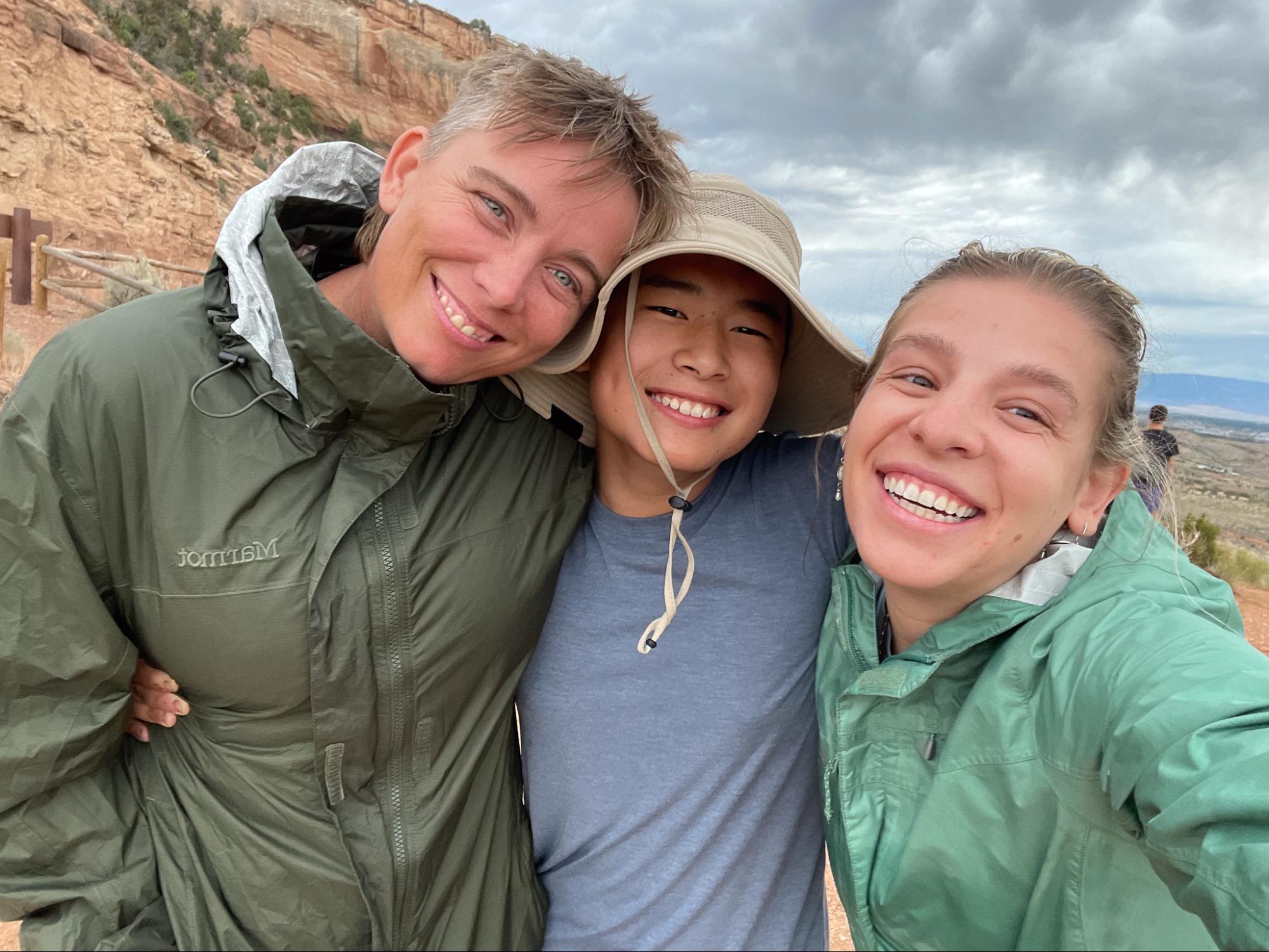
Amy, BOEC intern, and Caleb, participant, and Alli, BOEC intern and course photographer
The most rewarding part of the course for staff members was observing the participants improve their communication and comfort level with each other and the staff. They learned to express their needs, such as requesting water or sunscreen, and to set boundaries, like saying they didn’t appreciate being tapped on the shoulder for attention. They also communicated personal preferences, such as wanting to sit next to a different participant in the boat to discuss something they had bonded over. Although some participants communicated more directly than others, everyone was learning how to express themselves in a group setting with people they may have met only a few days prior. By the end of the week, the participants were excited about returning next year and reconnecting with their new friends.
A memorable moment for Caleigh was the realization that this trip, floating on a raft through the canyons of the Colorado River, was some of the participants’ first time in Utah. She shares, “We made sure to make a big deal of it when we passed the giant white letters painted on the canyon wall showing where Colorado turned into Utah. One of the participants in my boat, Xavier, notably shouted “Welcome to Utah!” as we were the first of the fleet to cross the state lines!”
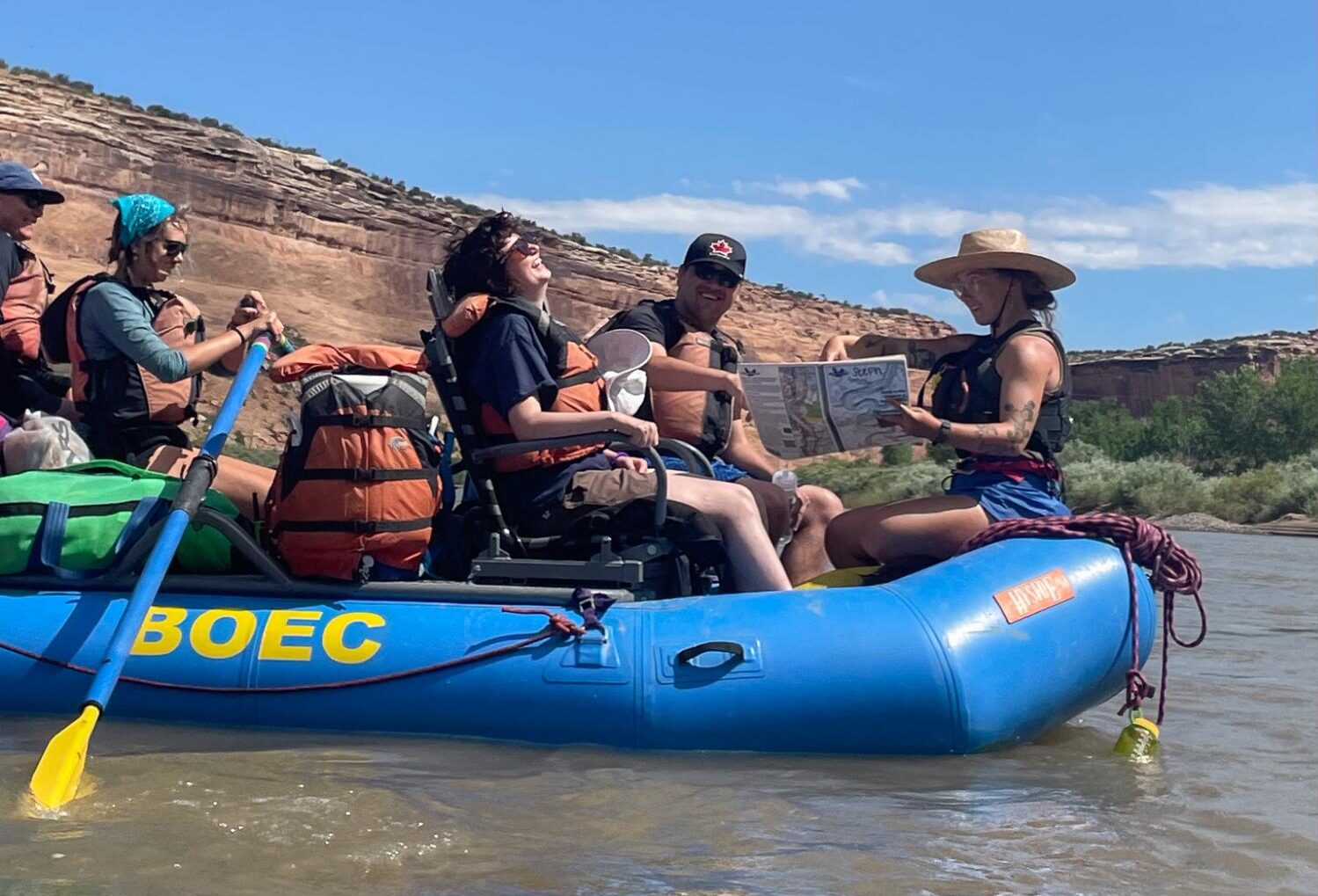
Navigation with Steph on the water.
One standout moment for Alli occurred on the second day of rafting. She describes it this way,
“Amy, a staff member, unexpectedly fell into the water. When questioned, she was uncertain about how it happened. Later that evening, Jada, a participant on the boat with her, jokingly admitted to pushing her in. From that point on, it became a running joke that Jada had pushed Amy into the water. Every time I teased Jada about it, she would let out the biggest laugh. On the final day of rafting, Amy and Jada re-enacted the entire incident, with Jada playfully pushing Amy into the river. It was hilarious and will undoubtedly remain a lasting joke. I guess we’ll never truly know if Jada pushed Amy on that second day.”
This camp provides an excellent opportunity to educate students and create a fun environment away from everyday life in the great outdoors. As participant Devon’s father Ross shared with us after last year’s Wilderness Camp,
“I have never heard my son laugh so much as [in] these past five days. Of course, this made me feel warm to this BOEC experience, and will have memories of a lifetime to share with family and friends.”
This is the beauty of Wilderness Camp.
To learn more about upcoming Wilderness Camps or other BOEC open enrollment opportunities please reach out to Claire DiCola at 970-453-6422 or email [email protected].

